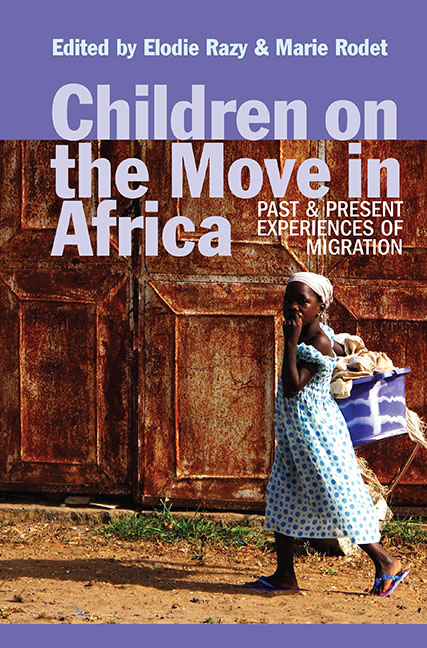Book contents
- Frontmatter
- Contents
- List of Illustrations
- Notes on Contributors
- Preface
- Acknowledgements
- Introduction: Child Migration in Africa: Key Issues & New Perspectives
- Part I CHILD MIGRANTS IN AFRICA: BEYOND THE DILEMMA OF VULNERABILITY v. AGENCY
- Part II BEING A CHILD & BECOMING A GENDERED ADULT: THE CHALLENGES OF MIGRATIONS IN CHILDHOOD
- Part III MOBILITY, IMAGINATION & MAKING NATIONS
- 6. Childhood, Space & Memory: Migrations of the Métis in Madagascar's Central Highlands (Nineteenth & Twentieth Centuries)
- 7. ‘We Were Mixed with All Types’: Educational Migration in the Northern Territories of Colonial Ghana
- 8. India–South Africa Mobilities in the First Half of the Twentieth Century: Minors, Immigration Encounters in Cape Town & Becoming South African
- 9. Education, Migration & Nationalism: Mapping the School Days of the First Generation of Southern Sudanese Nationalist Leaders, c. 1948–1972
- 10. Child Narration as a Device for Negotiating Space & Identity Formation in Recent Nigerian Migrant Fiction
- Bibliography
- Index
10. - Child Narration as a Device for Negotiating Space & Identity Formation in Recent Nigerian Migrant Fiction
from Part III - MOBILITY, IMAGINATION & MAKING NATIONS
Published online by Cambridge University Press: 25 October 2017
- Frontmatter
- Contents
- List of Illustrations
- Notes on Contributors
- Preface
- Acknowledgements
- Introduction: Child Migration in Africa: Key Issues & New Perspectives
- Part I CHILD MIGRANTS IN AFRICA: BEYOND THE DILEMMA OF VULNERABILITY v. AGENCY
- Part II BEING A CHILD & BECOMING A GENDERED ADULT: THE CHALLENGES OF MIGRATIONS IN CHILDHOOD
- Part III MOBILITY, IMAGINATION & MAKING NATIONS
- 6. Childhood, Space & Memory: Migrations of the Métis in Madagascar's Central Highlands (Nineteenth & Twentieth Centuries)
- 7. ‘We Were Mixed with All Types’: Educational Migration in the Northern Territories of Colonial Ghana
- 8. India–South Africa Mobilities in the First Half of the Twentieth Century: Minors, Immigration Encounters in Cape Town & Becoming South African
- 9. Education, Migration & Nationalism: Mapping the School Days of the First Generation of Southern Sudanese Nationalist Leaders, c. 1948–1972
- 10. Child Narration as a Device for Negotiating Space & Identity Formation in Recent Nigerian Migrant Fiction
- Bibliography
- Index
Summary
Several factors account for the emergence of the migrant fiction tradition that underscores the imperative of mobility in African literature. As a corpus, African literature is generally viewed as a responsible art through which writers relate their socio-historical experiences and show their inclinations towards social commitment. Migration is a human phenomenon with social, economic and cultural significance. In other words, the theme of migration in African letters is a response to the socio-historical dynamics of the twenty-first century. Aside from migration's multidisciplinary relevance, it has remained a strong trope in the African creative imagination. Fictional narratives of migration appeal to the sensibilities of writers (in this case, Nigerian writers), because of their potential to represent the experience of living in exile. In fact, exilic consciousness remains a vibrant theme in African literature due to the ravages experienced by most post-independence African states. It is therefore imperative that African fiction captures contemporary realities of migration in the emerging corpus of third-generation African writers.
The continued exploration of migrant aesthetics and representations of migratory experiences in post-colonial African literature has been a response to the dictates of the twentieth century, where writers cross boundaries and become ‘cultural travellers’ whose works portray experiences in diverse settings. This pot-pourri of cultural experiences enables them to fashion a distinct character of ‘cosmopolitanism’. This is akin to ‘Afropolitanism’, which seeks to connect Africa to ‘mainstream’ intellectual knowledge production and dissemination. In evaluating this trend, Boehmer writes:
In the 2000s the generic postcolonial writer is more likely to be a cultural traveller, or an ‘extra-territorial’, than a national. Ex- colonial by birth, ‘Third World’ in cultural interest, cosmopolitan in almost every other way, he or she works within the precincts of the Western metropolis while at the same time retaining thematic and/or political connections with a national, ethnic, or regional background.
It should be pointed out that the migrant tradition in African literary hybrid consciousness necessarily has political and economic ancestries. The relationship between the colonizer and the colonized, for instance, has encouraged migration and/or constant mobility among African writers. In most African societies, the former colonial powers continue to wield such diverse influences that there is a historical pull for refuge in Western capitals.
- Type
- Chapter
- Information
- Children on the Move in AfricaPast and Present Experiences of Migration, pp. 191 - 204Publisher: Boydell & BrewerPrint publication year: 2016

